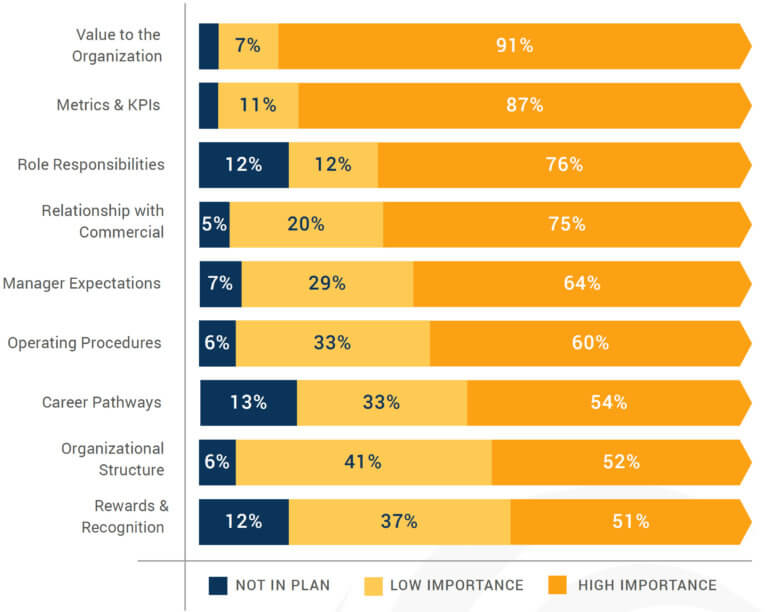During our recent study on MSL excellence, we talked with one Medical Affairs leader that was forced to redo a significant amount of work due to lack of alignment on the role internationally. “We didn’t get alignment on the MSL role prior to starting our MSL Excellence work. We got two years into the work and realized how disconnected we were across the organization. We ended up going back and defining the basics of the role. It cost us two years of effort because of not starting in the right place.”
Over 110 participants indicated that the top three areas of focus around MSL team design are value, metrics, and role responsibilities.

VALUE
Most of the interviewees we talked with are focused on articulating the value of their MSL team with internal stakeholders. The organizations inherently value the MSL role; however, there are leadership expectations that they can quantitatively measure value. In general, the internal stakeholders understand the value the MSL teams provide to the HCP, but they do not see the same level of value directly back to the company. Many leaders are focused on formalizing and measuring insight generation as a method for contributing value internally. They believe insight generation is a critical role responsibility, but there is not a concentrated effort to improve the tools, training, and processes.
ROLES
Individual MSLs report that they are clear on the expectations of their role. However, those responsible for MSL Excellence strategies report that clarifying the role expectations is a top priority. Organizations have significant variability in the role definition of the MSL. These discrepancies cause issues as their organizations are attempting to become more consistent in the role, training, metrics, and systems.
Most organizations do not articulate the role expectations at an adequate level of detail. This can lead to people with different educational backgrounds and work experience interpreting their responsibilities differently.
In addition to the challenges around MSL role expectations, companies are still struggling with the differentiation between various MSL roles such as MSL, Sr. MSL, and Executive MSL. They see the roles as necessary from a career progression standpoint, but often do not have the appropriate level of clarity about the differences in responsibilities as an MSL progresses.
METRICS AND KPIS
Medical Affairs continues to struggle to find the right metrics and KPIs for their MSL teams that go beyond measuring simple activities such as days in the field or number of visits. Many leaders are being pushed by their organization to become more mature with their reporting and metrics. Activity metrics remain important for the team manager, but are not the most appropriate metrics to report to senior leadership. Most of the MSLs do not believe the metrics they are being held accountable to accurately represent the work they are doing or the value they are adding to the organization.
Learn more about the other areas Medical Affairs leaders are including in their MSL Excellence strategies by downloading the entire study for free at www.accelerationpoint.com/mslstudy.

